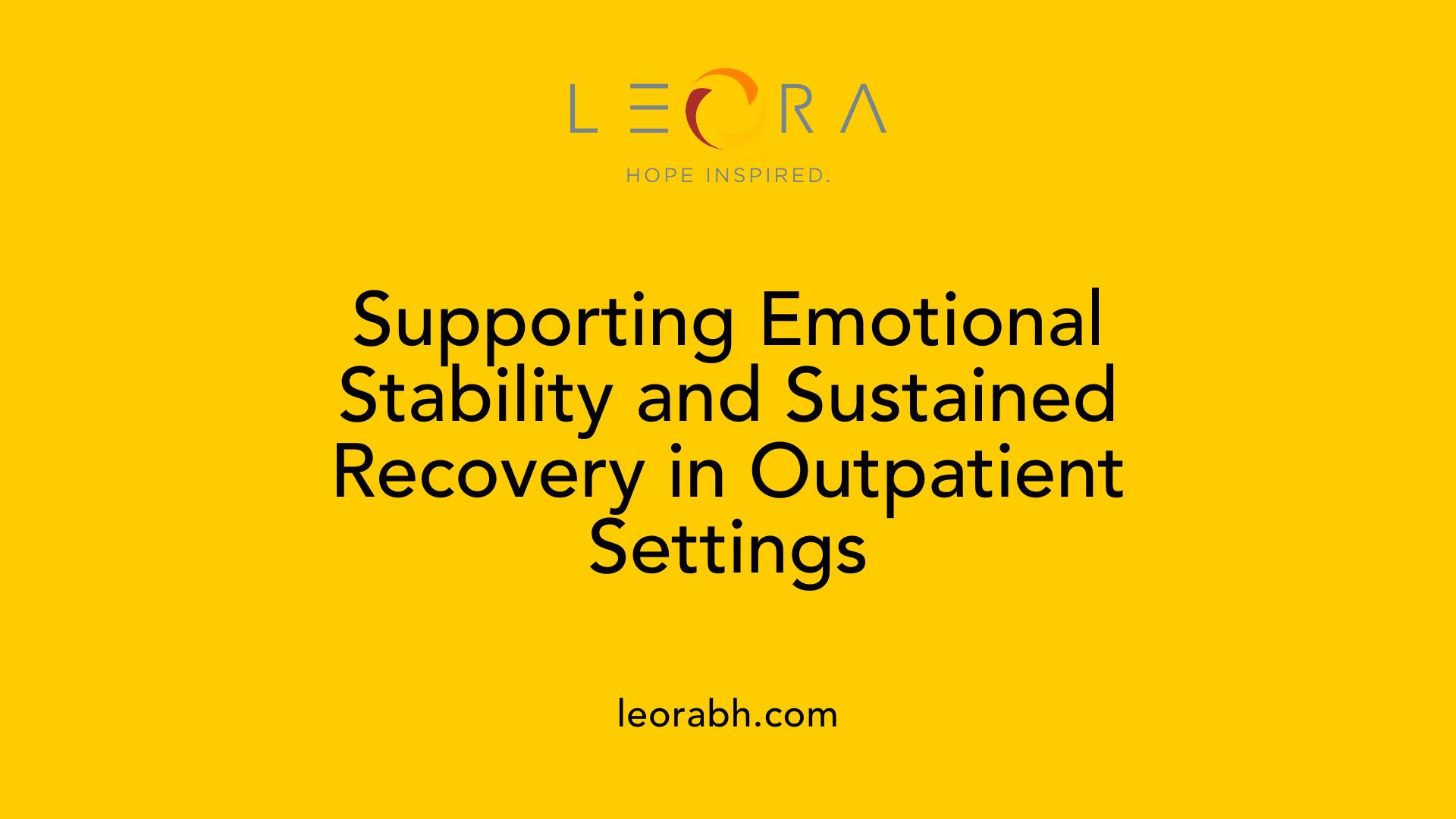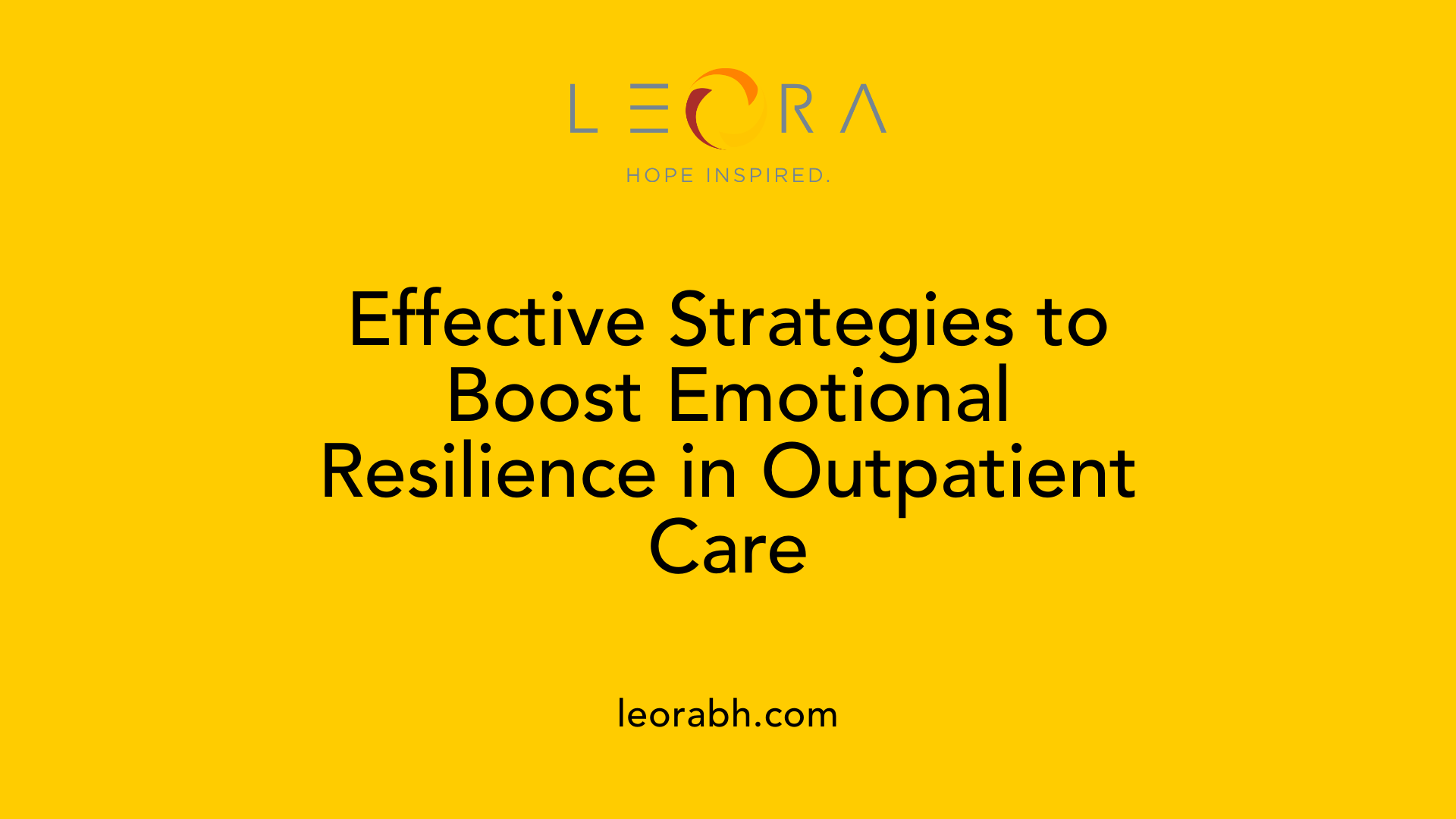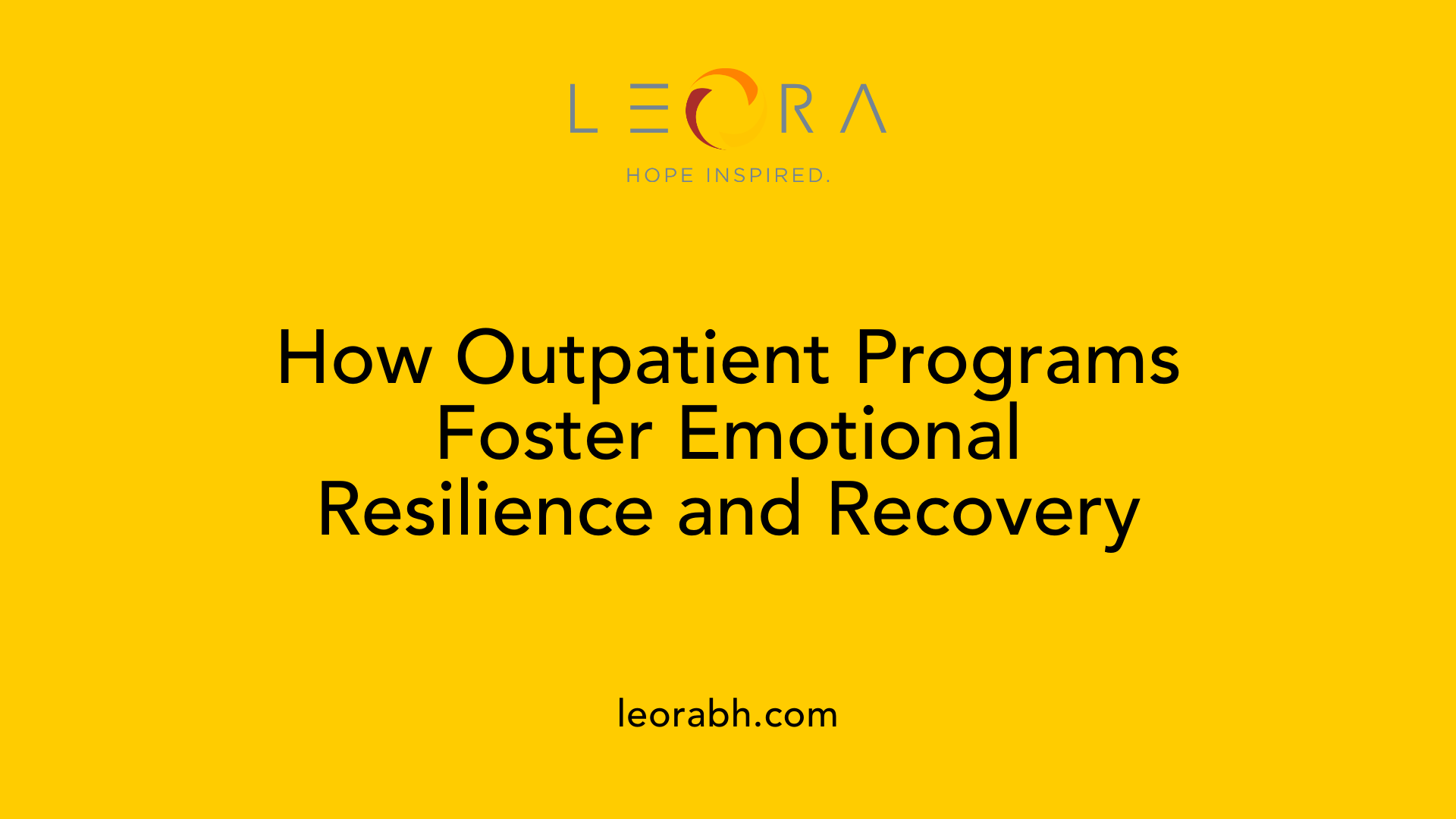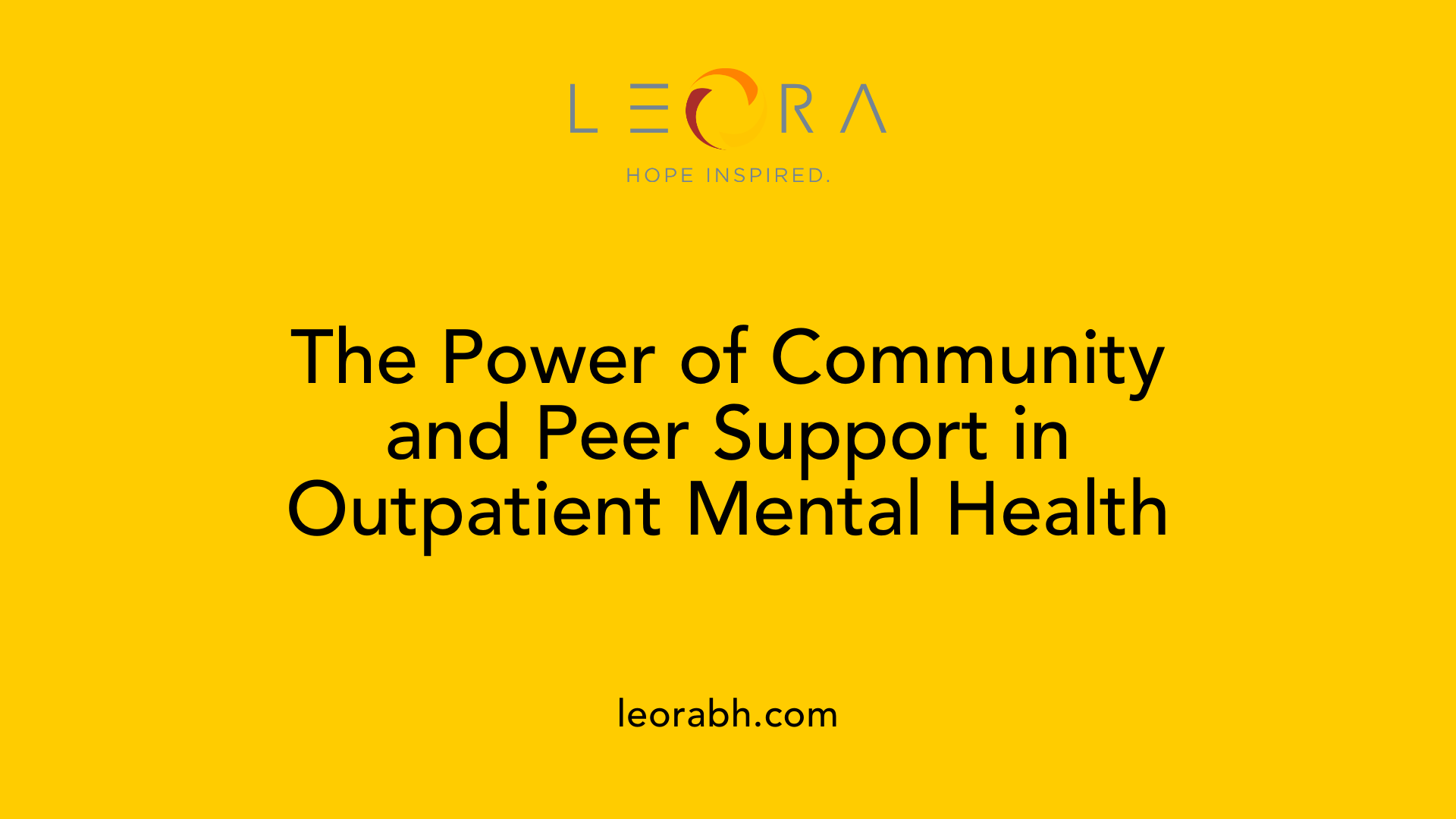How Outpatient Programs Promote Emotional Resilience
Empowering Recovery through Community and Skill-Building
The Role of Outpatient Programs in Fostering Resilience
Outpatient mental health programs are vital components of the recovery landscape, offering flexible, comprehensive treatment options that empower individuals to develop emotional resilience. Unlike inpatient care, outpatient services enable clients to participate in therapy while maintaining their daily routines, fostering real-world application of coping skills. These programs emphasize a holistic approach—integrating psychological interventions, community engagement, peer support, and lifestyle modifications—to support sustained recovery and emotional strength.
Core Components and Goals of Intensive Outpatient Programs (IOPs)
Intensive Outpatient Programs (IOPs) serve as a flexible yet comprehensive option for individuals managing mental health conditions or substance use issues. These programs aim to foster recovery by combining various therapeutic elements that promote emotional resilience and behavioral health.
Key components of IOPs include group therapy, where individuals share experiences and build communal support. This fosters a sense of belonging and encourages shared learning. Individual counseling offers personalized guidance, addressing specific challenges and goals. Family therapy helps strengthen home support systems and improve communication within familial relationships.
Psychoeducation is another vital aspect, equipping clients with knowledge about their conditions, triggers, and relapse prevention. Therapies such as CBT and Motivational Interviewing are commonly employed to reframe negative thoughts, strengthen motivation, and teach effective coping strategies.
Relapse prevention strategies are integrated into treatment plans, focusing on recognizing early warning signs and managing cravings. Holistic therapies like mindfulness, yoga, and stress reduction practices complement the psychological interventions, promoting overall well-being.
Most IOPs involve sessions multiple times a week, totaling approximately 9 to 15 hours, allowing individuals to continue their daily routines like work or school. The goal is to develop skills that enable clients to handle stress, avoid triggers, and sustain long-term recovery.
Community involvement and peer support are emphasized, fostering social resilience and encouraging ongoing engagement with support networks. These programs act as a bridge between inpatient care and independent living, ensuring continuous progress and relapse prevention.
| Component | Description | Additional Info |
|---|---|---|
| Group therapy | Sharing experiences in a supportive environment | Encourages community support |
| Individual counseling | Personalized sessions to address specific needs | Tailored treatment plans |
| Family therapy | Enhances family involvement and support | Improves communication |
| Psychoeducation | Educating clients about their condition | Reduces stigma, increases awareness |
| CBT, Motivational Interviewing | Evidence-based therapies for behavior change | Builds coping and motivation |
| Holistic therapies | Mindfulness, yoga, stress reduction | Promotes emotional regulation |
These components collectively help clients build resilience, manage challenges, and work toward sustained well-being, reflecting the fundamental goals of IOPs to support ongoing recovery and adaptation.
Supporting Emotional Stability and Recovery through Outpatient Treatment

What role do outpatient programs play in supporting emotional stability and recovery?
Outpatient programs are essential in helping individuals achieve and maintain emotional stability during recovery. They provide a flexible, structured setting for ongoing therapy, which can include individual, group, and family sessions tailored to the person's needs. These programs focus on teaching coping mechanisms that empower individuals to manage cravings, triggers, and stress.
One of the crucial aspects of outpatient care is relapse prevention training. Clients learn skills to recognize early warning signs and develop strategies to prevent setbacks. Daily habits such as mindfulness, self-care, and emotional regulation are emphasized, fostering resilience and a sense of control.
Community support plays a vital role by encouraging social connections with family, friends, and support groups, which cultivate a strong network of encouragement and accountability. Many outpatient services also incorporate medication management when necessary, ensuring comprehensive care for mental health and substance use issues.
Holistic approaches, including yoga, nutrition education, and stress reduction techniques, complement therapy by strengthening overall well-being. Family involvement and education are prioritized to enhance support at home and promote better recovery outcomes.
Overall, outpatient programs serve as a key element in sustaining long-term recovery, combining structured treatment, skill development, community engagement, and family support to foster emotional resilience and stability.
Therapeutic Techniques that Foster Emotional Resilience
How do outpatient programs promote emotional resilience through therapeutic techniques?
Outpatient programs enhance emotional resilience by utilizing a variety of evidence-based therapies tailored to individual needs. Cognitive-Behavioral Therapy (CBT), Dialectical Behavior Therapy (DBT), and Acceptance and Commitment Therapy (ACT) are the main approaches commonly deployed.
CBT focuses on identifying and reframing negative thoughts, fostering healthier thinking patterns, and developing better coping strategies. It encourages individuals to challenge harmful beliefs and replace them with positive, realistic alternatives.
DBT emphasizes emotional regulation, distress tolerance, and interpersonal effectiveness. It teaches mindfulness and acceptance, helping clients manage intense emotions and improve their relationships.
ACT promotes acceptance of challenging feelings while committing to actions aligned with personal values. It emphasizes mindfulness, cognitive defusion, and living in the present, reducing the struggle against negative emotions.
In addition to these therapies, practices like mindfulness exercises, journaling, and active listening are incorporated. Mindfulness helps individuals stay grounded and aware of their emotional state, while journaling fosters self-reflection and emotional processing.
Peer support plays a significant role as well, offering shared experiences, encouragement, and motivation.
Healthy coping mechanisms, including exercise, proper nutrition, and self-care routines, are integral to building resilience. These components foster a supportive environment that encourages growth and recovery.
Personalized treatment plans within outpatient programs ensure that clients receive tailored interventions. Regular monitoring and support keep individuals engaged and adaptable to life's challenges.
Overall, outpatient programs create a comprehensive framework that promotes emotional resilience through therapy, self-awareness, support networks, and healthy habits. This integrated approach helps individuals sustain recovery, adapt to stressors, and develop long-term emotional strength.
Strategies and Methods to Enhance Emotional Resilience

What strategies and methods are used in outpatient programs to foster emotional resilience?
Outpatient mental health programs use a variety of approaches that focus on strengthening emotional resilience. These programs often include individual therapy, group sessions, and family involvement, all aimed at teaching coping skills and emotional regulation.
Evidence-based therapies such as Cognitive-Behavioral Therapy (CBT), Dialectical Behavior Therapy (DBT), and Acceptance and Commitment Therapy (ACT) are central to these efforts. They assist individuals in managing stress, regulating emotions, and addressing negative thought patterns.
Mindfulness exercises and stress reduction techniques are incorporated to promote present-moment awareness and calmness, helping clients respond rather than react to challenges.
Psychoeducation plays a key role by increasing understanding of emotional health, teaching clients about their emotional responses and how to manage them effectively.
Support from peer groups and engagement in community activities foster social resilience by reducing feelings of isolation and building a sense of belonging.
Personalized treatment plans are tailored to the unique needs of each individual, ensuring that interventions are relevant and effective.
Additional strategies include ongoing assessments to monitor progress, the use of virtual platforms to increase accessibility, and integration of community resources to reinforce resilience skills.
These comprehensive approaches help clients develop healthier coping mechanisms, improve emotional stability, and sustain recovery over time.
Facilitating Emotional Resilience in Outpatient Treatment

How does outpatient mental health treatment facilitate emotional resilience development?
Outpatient mental health treatment plays a vital role in fostering emotional resilience, which is essential for recovery from mental health challenges. It offers targeted psychosocial interventions that help individuals adapt and thrive despite ongoing stressors.
Core components of outpatient programs include cognitive-behavioral therapy (CBT), mindfulness practices, and emotion regulation strategies. These approaches teach clients how to manage negative thoughts, regulate emotions, and develop healthier responses to triggers and stress. For example, CBT helps reframe harmful thinking patterns, while mindfulness techniques promote present-moment awareness and acceptance of emotions.
In addition to individual therapies, psychoeducation about mental health conditions and resilience-building behaviors empowers clients with knowledge and skills. Community support networks, such as peer groups, support groups, and family involvement, further reinforce social connectedness, which is crucial for emotional growth.
Experiential learning is a significant aspect of outpatient treatment. Group therapy sessions provide a safe space for sharing experiences, practicing social skills, and learning from others' journeys. These shared experiences foster a sense of belonging and collective resilience.
Overall, outpatient mental health services support resilience through a multifaceted approach. They address psychological skills, promote social support, and integrate community resources to help individuals bounce back from adversity and sustain recovery.
Building and Sustaining Emotional Resilience through Outpatient Care

How do outpatient programs contribute to building emotional resilience?
Outpatient programs play a vital role in fostering emotional resilience by utilizing evidence-based therapies such as cognitive-behavioral therapy (CBT), dialectical behavior therapy (DBT), and mindfulness practices. These treatments help individuals develop essential skills to manage stress, cope with triggers, and adapt to life's challenges effectively. Besides individual therapy, group sessions and peer support networks create opportunities for social bonding and shared understanding, which are crucial for psychological resilience.
From a neurobiological perspective, outpatient interventions can enhance the regulation of the body's stress response system, notably the hypothalamic-pituitary-adrenal (HPA) axis. Improved regulation helps reduce the impact of stress hormones like cortisol, fostering better emotional control. Enhanced connectivity within brain regions such as the prefrontal cortex and amygdala supports emotional regulation capacities.
Community support is also integral to resilience building. Support groups, family therapy, and community resources strengthen social bonds, offering emotional validation and practical assistance. This psychosocial environment promotes positive psychological qualities like optimism, self-efficacy, and social connectedness.
Additionally, outpatient programs often incorporate lifestyle modifications. Engaging in physical activity, adopting healthy nutrition, and prioritizing sleep can influence neurochemical balances—namely, increases in neuropeptide Y (NPY) and dehydroepiandrosterone (DHEA)—which are linked to stress resilience. These neurochemical factors play a role in reducing anxiety, supporting neuroplasticity, and promoting emotional balance.
By addressing both biological mechanisms and social factors, outpatient care creates a comprehensive framework for resilience. This holistic approach not only alleviates mental health symptoms but also fosters long-term emotional strength, enabling individuals to navigate future challenges more effectively and sustain recovery.
The Significance of Community and Peer Support in Outpatient Settings

Why are community and peer support so important in outpatient mental health treatments?
Community and peer support play a vital role in outpatient mental health care by providing individuals with a sense of shared experience and mutual understanding. When people coping with mental health challenges connect with others who have faced similar struggles, they often feel less isolated and stigmatized. This sense of belonging can boost emotional resilience and foster hope.
Support networks, such as peer groups, recovery coaches, and trained specialists, encourage engagement in treatment. They help build trust and confidence, making individuals more willing to participate actively in their recovery process. These connections also broaden access to resources, information, and encouragement that complement professional care.
Involving trained peer supporters—people with lived experience—can be especially powerful. They serve as role models, offering guidance, emotional support, and practical advice. Recovery coaches and peer specialists help clients develop coping skills, navigate treatment options, and maintain motivation.
Integrating community and peer support enriches the traditional clinical approach by creating a more holistic recovery environment. It enhances resilience, encourages ongoing participation in care, and ultimately supports sustained mental health improvements.
How does this support reduce stigma and feelings of isolation?
Community and peer programs foster a culture of acceptance and openness. When individuals share their stories and hear others’ experiences, it diminishes shame and stigma often associated with mental health conditions. This shared understanding helps break down barriers to seeking help.
Participating in peer-led groups or community activities can alleviate loneliness, providing emotional comfort and social connection. The feeling of being part of a supportive community boosts confidence and motivation to stick with treatment plans.
What impact does broader support have on treatment outcomes?
A strong support network enhances engagement and adherence to therapy, medication, and other interventions. It encourages positive behavioral changes and resilience in facing setbacks. As a result, individuals often experience improved mental health outcomes and greater long-term stability.
How do trained peers and recovery coaches contribute?
Trained peers and recovery coaches bring empathy, trust, and practical insights to the recovery process. Their shared experiences help foster a safe space for vulnerability, where clients can express concerns openly. These professionals are skilled at helping clients develop coping strategies, set realistic goals, and reconnect with community resources.
In summary...
Incorporating community and peer support into outpatient settings not only broadens the scope of assistance available but also deepens the quality of care. It creates a resilient, empowering environment that supports lasting recovery and promotes well-being.
Empowerment and Long-Term Resilience
Ultimately, outpatient programs serve as a vital bridge connecting clinical intervention, community support, and personal empowerment. Through evidence-based therapies, peer involvement, lifestyle modifications, and ongoing community engagement, these programs foster enduring emotional resilience. They equip individuals with the skills, support networks, and self-awareness necessary to navigate life's challenges confidently, supporting sustained recovery and a life of emotional stability and purpose.
References
- Building Emotional Resilience During Recovery
- Building Emotional Resilience: How It Can Strengthens Mental Health
- How Intensive Outpatient Programs Transform Mental Health
- How Peer Support Can Benefit Outpatient Treatment
- Fostering Resilience through Inpatient Mental Health Programs
- Intensive Outpatient Programs - What is an IOP and why is it used?
- How Acceptance & Commitment Therapy Builds Emotional Resilience
- What is Outpatient Treatment for Mental Health?
- Building Resilience Through Therapy in Intensive Outpatient Programs
Find Your Inner Light
Related Articles
Schedule an Assessment
Leora Behavioral Health provides comprehensive treatment services, including ambulatory detox, mental health IOP, and SUD IOP, to support your journey toward lasting recovery.
Our caring team will guide you through the admissions process and create a personalized treatment plan tailored to your unique needs. We welcome walk-ins. If you or a loved one is struggling, reach out today. We’re here to help.


.svg)




.svg)
.svg)
.svg)
.svg)
